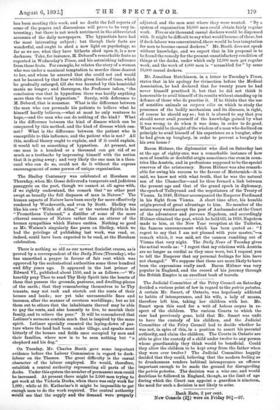Baron Hiibner, the diplomatist who died on Saturday last at
the age of eighty-one, was a remarkable instance of how men of humble or doubtful origin sometimes rise even in coun- tries like Austria, and in professions supposed to be the special reserves of the aristocracy. Baron Hiibner was also remark- able for owing his success to the favour of Metternich—it is said, we know not with what truth, that he was the natural son of the Chancellor—and he thus formed a link between the present age and that of the grand epoch in diplomacy, the epoch of Talleyrand and the negotiators of the Treaty of Vienna. In 1848, Hubner accompanied the Emperor Ferdinand in his flight from Vienna. A short time after, his humble origin proved of great advantage to him. No member of the aristocracy would accept the post of Ambassador at the Court of the adventurer and parvenu Napoleon, and accordingly Hubner obtained the post, which he held till, in 1859, Napoleon made to him, at the New Year reception at the Tuileries, the famous announcement which has been quoted as : "I regret to say that I am not pleased with your master,"—a remark which, it was said, set the cannon rambling out of Vienna that very night. The Daily News of Tuesday gives the actual words as : "I regret that my relations with Austria are no longer as cordial as they once were, but I request you to tell the Emperor that my personal feelings for him have not changed." We suppose that these are more likely to have been the expressions really used. Baron Hiibner was very popular in England, and the record of his journey through the British Empire is an excellent book of travels.


































 Previous page
Previous page